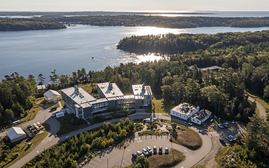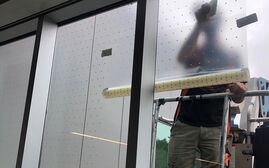Processing Your Payment
Please do not leave this page until complete. This can take a few moments.
- News
-
Editions
-
- Lists
-
Viewpoints
-
Our Events
-
Event Info
- Women's Leadership Forum 2025
- On the Road with Mainebiz in Bethel
- Health Care Forum 2025
- On The Road with Mainebiz in Greenville
- On The Road with Mainebiz in Waterville
- Small Business Forum 2025
- Outstanding Women in Business Reception 2025
- On The Road with Mainebiz in Bath
- 60 Ideas in 60 Minutes Portland 2025
- 40 Under 40 Awards Reception 2025
- On The Road with Mainebiz in Lewiston / Auburn
- 60 Ideas in 60 Minutes Bangor 2025
Award Honorees
- 2025 Business Leaders of the Year
- 2024 Women to Watch Honorees
- 2024 Business Leaders of the Year
- 2023 NextUp: 40 Under 40 Honorees
- 2023 Women to Watch Honorees
- 2023 Business Leaders of the Year
- 2022 NextUp: 40 Under 40 Honorees
- 2022 Women to Watch Honorees
- 2022 Business Leaders of the Year
-
-
Calendar
-
Biz Marketplace
- News
- Editions
- Lists
- Viewpoints
-
Our Events
Event Info
- View all Events
- Women's Leadership Forum 2025
- On the Road with Mainebiz in Bethel
- Health Care Forum 2025
- On The Road with Mainebiz in Greenville
- On The Road with Mainebiz in Waterville
- + More
Award Honorees
- 2025 Business Leaders of the Year
- 2024 Women to Watch Honorees
- 2024 Business Leaders of the Year
- 2023 NextUp: 40 Under 40 Honorees
- 2023 Women to Watch Honorees
- 2023 Business Leaders of the Year
- + More
- 2022 NextUp: 40 Under 40 Honorees
- 2022 Women to Watch Honorees
- 2022 Business Leaders of the Year
- Nomination Forms
- Calendar
- Biz Marketplace
Report calls for 'bold investment' in ocean research
 Photo / Courtesy of Bigelow Laboratory For Ocean Sciences, Reggie Huang
Deborah Bronk, president and CEO of Bigelow Laboratory for Ocean Sciences
Photo / Courtesy of Bigelow Laboratory For Ocean Sciences, Reggie Huang
Deborah Bronk, president and CEO of Bigelow Laboratory for Ocean Sciences
“Bold investment” in scientific research is needed to respond to rising sea levels and ocean temperatures and other changes that will impact coastal communities and their economies, according to a new report.
The Washington, D.C.-based American Geophysical Union, a nonprofit that represents 60,000 members in 137 communities, updated its 2005 statement on the importance of ocean research and education as foundations for economic growth with a call for urgent action to respond to a host of climate-related changes in the world’s oceans, which include the expansion of low oxygen zones and changes in the chemistry of the ocean caused by increased carbon dioxide.
“In 2016 in the United States, 52% of the population lived in coastal watershed regions generating nearly 57% of the nation’s gross domestic product,” the nonprofit stated in a summary of its report. “Commercial fishing generates over $36 billion in income and more than 1 million jobs, while recreational fishing supports $14 billion in income and hundreds of thousands of additional jobs. In 2015, over 22% of U.S. domestic oil was produced from coastal and offshore waters.”
The revision was produced by a panel of five American Geophysical Union ocean scientist members, including Charles Colgan, a professor at the University of Southern Maine and a former Maine state economist who now primarily serves as director of research at the Center for the Blue Economy at the Middlebury Institute of International Studies in California.
Reached by phone, Colgan told Mainebiz that the revised statement “reflects the broader set of issues that marine research is dealing with, like climate change and its effects on coasts.”
The statement recognizes that social and economic issues are important in the face of these changes, he said.
“There’s a lot of attention now being given to the vulnerability of coastal communities from sea level rise,” he said. “There are concerns over changes in the lobster industry due to warming sea waters.”
The science is clear, said Colgan, that the Gulf of Maine is one of the fastest-warming ocean regions in the world.
“Lobsters are known to be sensitive to that,” he said. “There’s already substantial evidence that the lobster resource is shifting eastward and northward. It’s largely gone from southern New England. So there’s a lot of concern about what will become of the industry and the communities that depend on it.”
Falling behind the curve
Despite these trends, he said, federal research funding is drying up, making it difficult to monitor, predict and mitigate impacts of climate change sea level rise on coastal communities and activities like fishing and aquaculture.
“So one reason American Geophysical Union put that statement out was to remind people that the issues being dealt with are quite serious,” Colgan said. “The statement was really a kind of platform to tell people to talk with policy-makers and remind them the scientific community is quite worried about all of this.”
Still, he said, Maine has “a very good marine research infrastructure” between academic institutions and organizations like the Bigelow Laboratory for Ocean Sciences in East Boothbay to support research relevant to the Gulf of Maine,.
“The state is well-positioned to play an important role in whatever comes of marine research and education,” he said.
Even so, he said, keeping up with the latest science is a challenge, given the many emerging issues such as climate change and its effects on coastal communities that are rapidly changing the overall understanding of inherent risks to coastal communities and their economies.
Colgan said he’s particularly concerned about the ability of Maine’s coastal communities to respond to rising sea level.
“There are very few places in Maine that have done much of that planning,” he said. “There’s been no state support. Only Portland and a couple of other communities have aggressively dealt with it. And even Portland’s work I consider to be behind the curve because they’re not keeping up with a lot of the most recent information that’s been coming out. That’s the one that worries me the most, that the communities in Maine are threatened by climate change effects on the ocean.”













Comments